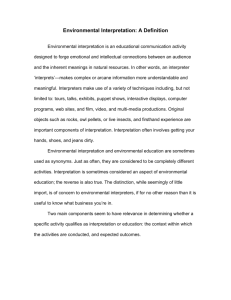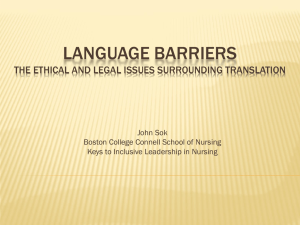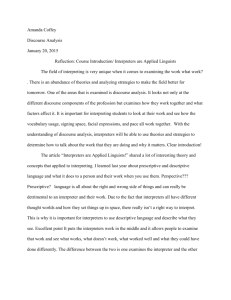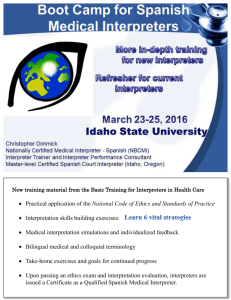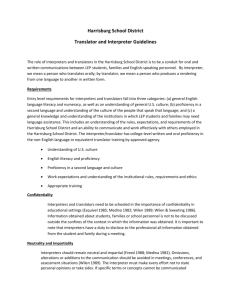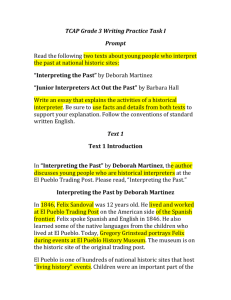Word
advertisement
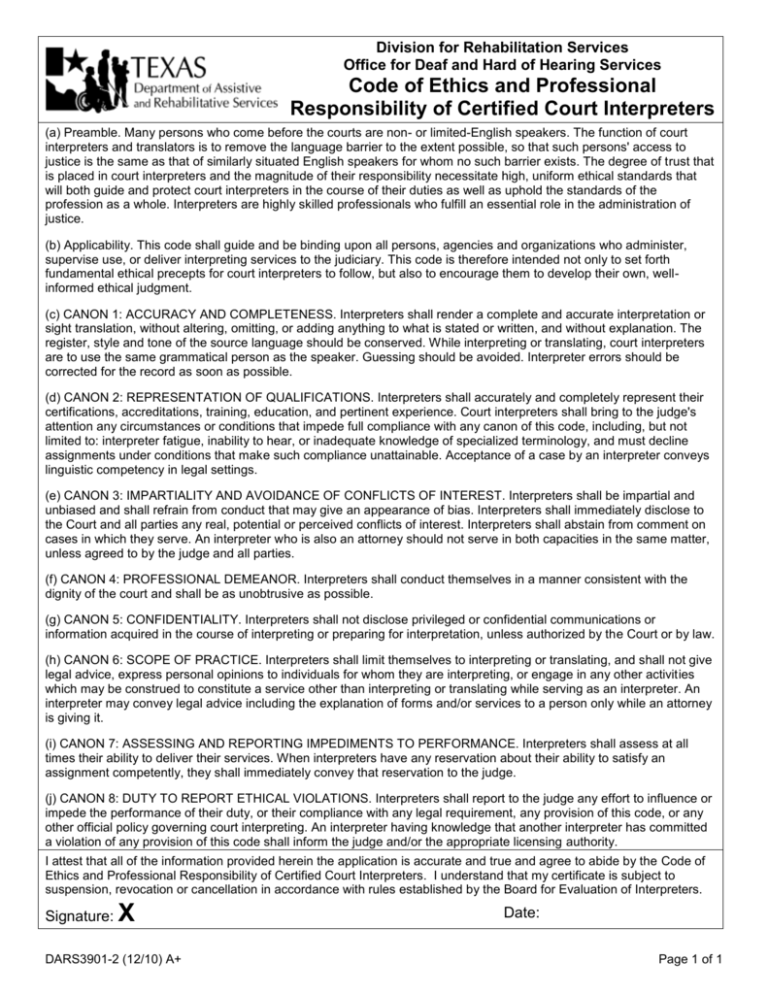
Division for Rehabilitation Services Office for Deaf and Hard of Hearing Services Code of Ethics and Professional Responsibility of Certified Court Interpreters (a) Preamble. Many persons who come before the courts are non- or limited-English speakers. The function of court interpreters and translators is to remove the language barrier to the extent possible, so that such persons' access to justice is the same as that of similarly situated English speakers for whom no such barrier exists. The degree of trust that is placed in court interpreters and the magnitude of their responsibility necessitate high, uniform ethical standards that will both guide and protect court interpreters in the course of their duties as well as uphold the standards of the profession as a whole. Interpreters are highly skilled professionals who fulfill an essential role in the administration of justice. (b) Applicability. This code shall guide and be binding upon all persons, agencies and organizations who administer, supervise use, or deliver interpreting services to the judiciary. This code is therefore intended not only to set forth fundamental ethical precepts for court interpreters to follow, but also to encourage them to develop their own, wellinformed ethical judgment. (c) CANON 1: ACCURACY AND COMPLETENESS. Interpreters shall render a complete and accurate interpretation or sight translation, without altering, omitting, or adding anything to what is stated or written, and without explanation. The register, style and tone of the source language should be conserved. While interpreting or translating, court interpreters are to use the same grammatical person as the speaker. Guessing should be avoided. Interpreter errors should be corrected for the record as soon as possible. (d) CANON 2: REPRESENTATION OF QUALIFICATIONS. Interpreters shall accurately and completely represent their certifications, accreditations, training, education, and pertinent experience. Court interpreters shall bring to the judge's attention any circumstances or conditions that impede full compliance with any canon of this code, including, but not limited to: interpreter fatigue, inability to hear, or inadequate knowledge of specialized terminology, and must decline assignments under conditions that make such compliance unattainable. Acceptance of a case by an interpreter conveys linguistic competency in legal settings. (e) CANON 3: IMPARTIALITY AND AVOIDANCE OF CONFLICTS OF INTEREST. Interpreters shall be impartial and unbiased and shall refrain from conduct that may give an appearance of bias. Interpreters shall immediately disclose to the Court and all parties any real, potential or perceived conflicts of interest. Interpreters shall abstain from comment on cases in which they serve. An interpreter who is also an attorney should not serve in both capacities in the same matter, unless agreed to by the judge and all parties. (f) CANON 4: PROFESSIONAL DEMEANOR. Interpreters shall conduct themselves in a manner consistent with the dignity of the court and shall be as unobtrusive as possible. (g) CANON 5: CONFIDENTIALITY. Interpreters shall not disclose privileged or confidential communications or information acquired in the course of interpreting or preparing for interpretation, unless authorized by the Court or by law. (h) CANON 6: SCOPE OF PRACTICE. Interpreters shall limit themselves to interpreting or translating, and shall not give legal advice, express personal opinions to individuals for whom they are interpreting, or engage in any other activities which may be construed to constitute a service other than interpreting or translating while serving as an interpreter. An interpreter may convey legal advice including the explanation of forms and/or services to a person only while an attorney is giving it. (i) CANON 7: ASSESSING AND REPORTING IMPEDIMENTS TO PERFORMANCE. Interpreters shall assess at all times their ability to deliver their services. When interpreters have any reservation about their ability to satisfy an assignment competently, they shall immediately convey that reservation to the judge. (j) CANON 8: DUTY TO REPORT ETHICAL VIOLATIONS. Interpreters shall report to the judge any effort to influence or impede the performance of their duty, or their compliance with any legal requirement, any provision of this code, or any other official policy governing court interpreting. An interpreter having knowledge that another interpreter has committed a violation of any provision of this code shall inform the judge and/or the appropriate licensing authority. I attest that all of the information provided herein the application is accurate and true and agree to abide by the Code of Ethics and Professional Responsibility of Certified Court Interpreters. I understand that my certificate is subject to suspension, revocation or cancellation in accordance with rules established by the Board for Evaluation of Interpreters. Signature: X DARS3901-2 (12/10) A+ Date: Page 1 of 1

